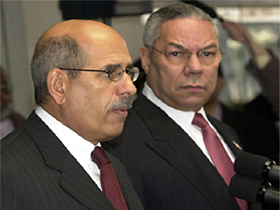ElBaradei's Insurmountable Obstacles
By Dominic Moran for ISN
ElBaradei, former head of the International Atomic Energy Agency (IAEA), has said he will run for president in Egypt given the right conditions, but may choose to boycott next year's poll, pending electoral and constitutional reform.
ElBaradei has succeeded in drawing significant political, academic and activist support for his National Association for Change and the type of media foment rarely seen in what has been an effectively comatose political system since 2005.
His personal appeal owes much to the fact the decades he has spent outside the country leave him untainted by the Machiavellian political dealings of the ruling National Democratic Party (NDP) and secular opposition. These machinations have severely undermined the latter as a legitimate counter both to the NDP and Muslim Brotherhood.
As usual, the development of a unitary opposition front in Egypt is seemingly being prevented by government co-option of the opposition, with a number of small parties reportedly forming an anti-ElBaradei front.
Under pressure from a two-month state crackdown - clearly designed to inhibit its ability to campaign for October's parliamentary elections - the Muslim Brotherhood is also playing it safe. Officials attended the external pageFebruary meetingcall_made in which ElBaradei's coalition was formed, but the movement subsequently announced that it would not back any presidential candidate.
ElBaradei, in fact, has little to no chance of standing for election in 2011.
external pageEmendations to the constitutioncall_made in 2005 and 2007 make it almost impossible for independent and opposition presidential candidates to run for office and removes judicial oversight of the polls - a tacit recognition of the activist stance on fraud and civil/judicial rights taken by some judges.
Importantly, unlike in 2005, the US appears ready to sit this one out. This stance appears influenced primarily by the Brotherhood's strong showing in the previous Peoples' Assembly election and fears regarding potential further gains in October.
The US enjoyed at best patchy relations with ElBaradei at the IAEA, and his open advocacy of the incorporation of the Brotherhood in the Egyptian political system as a legitimate party will win few backers in Washington.
US financial support for secular opposition parties has been cut and, should they run, both ElBaradei and Ayman Nour (who enjoyed US backing in 2005) will likely be left to the tender mercies of the NDP in 2011.
Neither will pose a threat to President Hosni Mubarak, who returned to work this month after an operation to remove his gallbladder in March and has given no indications he will step down.
Both father and son deny that Gamal Mubarak holds presidential aspirations, but his role as head of the key NDP Policies Committee and personal association with key national ventures and economic reforms tend to undermine this claim.
Here, it is germane to note that an important organizer of ElBaradei's new coalition is Hassan Nafaa, external pagecoordinatorcall_made of the Popular Campaign Against the Inheritance of Power.
While ElBaradei is enjoying his moment in the national spotlight, it appears all but certain that the next president will come from within the NDP or associated state institutions.
Ultimately, the security services will play an important role in determining the identity of the next president and will almost certainly reject the fundamental system reforms proposed by ElBaradei.
Despite this, his political ascent trains an important spotlight on the current foment in Egyptian society for root and branch political and governance change, and reminds allied states of the need to differentiate between system maintenance and functionality.

